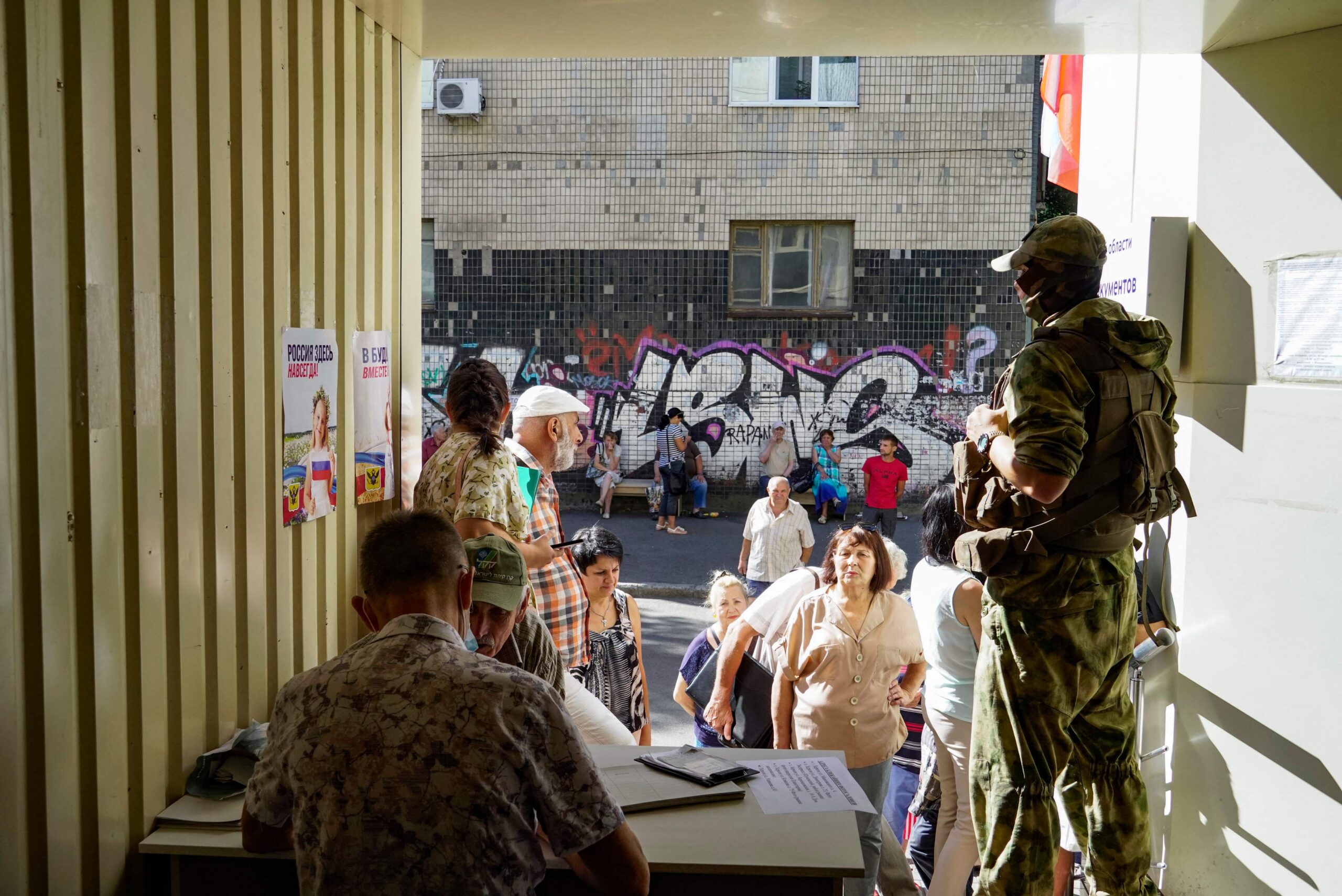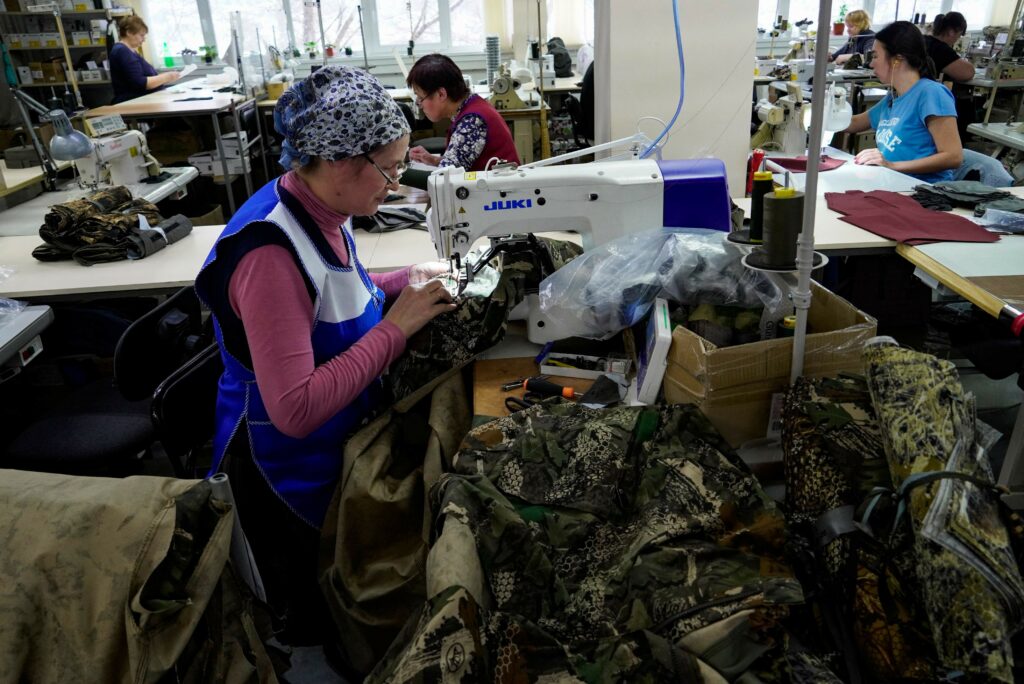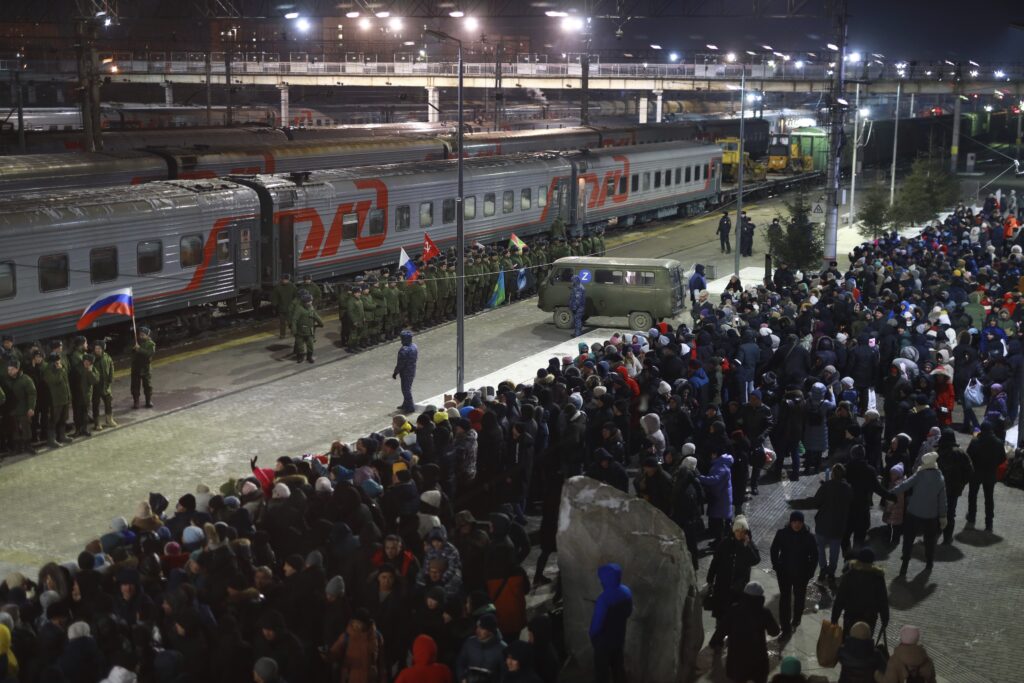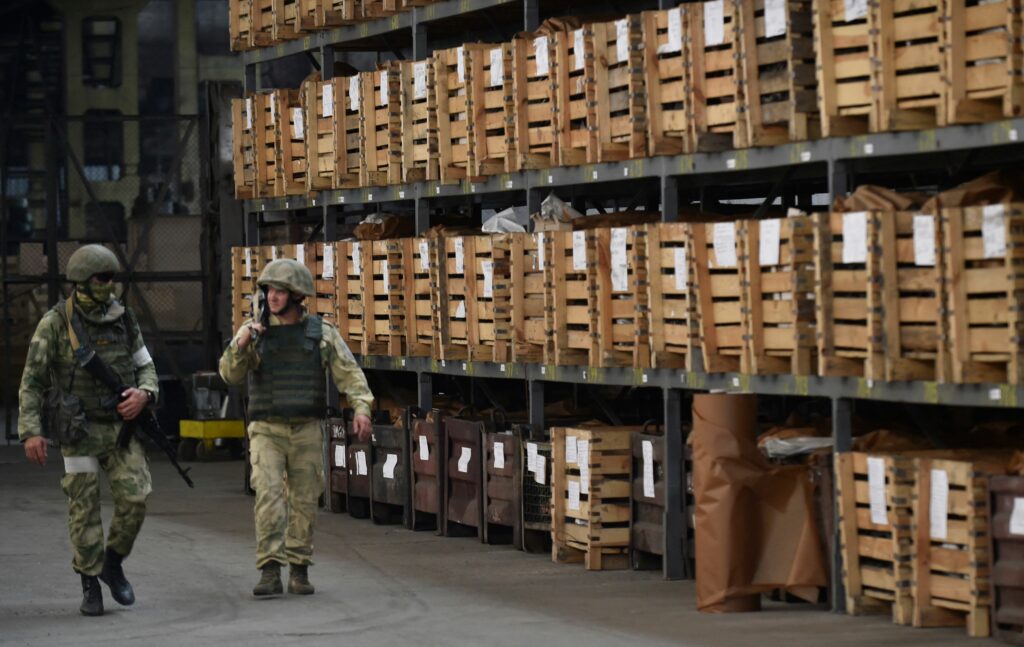The presidential administration is recruiting Russian officials to work in Donbas as well as the occupied Zaporizhzhia and Kherson Oblasts of Ukraine. They have already been given influential positions in local administrations. Teachers, physicians and police officers are also being offered jobs in these locations. The Russian authorities are recruiting officials and public sector employees with promises of quick career advancement and higher salaries. Moreover, their willingness to go to Donbas serves as the best proof of their loyalty to the government. This is how the Kremlin is building the foundations of an outpost state where civil servants and public sector employees are in no way tied to the locations they are seconded to and have no allegiance to their residents. They are centre-oriented and ready to carry out any orders of the central authorities.
Secondees
The upcoming «referendums on the accession» to Russia of the self-proclaimed Donetsk People’s Republic (DPR) and Luhansk People’s Republic (LPR) as well as the Russian-occupied Zaporizhzhia and Kherson Oblasts have yet to be conducted by the Kremlin, but Russian officials have already been given positions in local administrations. Vitaly Khotsenko, a former director of a department of the Ministry of Industry and Trade, became ‘prime minister’ of the DPR. Before joining the federal government, Khotsenko had occupied senior positions in the governments of Stavropol Krai and the Yamalo-Nenets Autonomous Okrug. Vladislav Kuznetsov, who had previously worked at the Sibur petrochemical company, had been United Russia’s MP in Bashkortostan and deputy governor of the Kurgan Oblast, was appointed first deputy head of the LPR government. First deputy chairman of the Vologda Oblast Anton Koltsov became head of the ‘government’ of the Zaporizhzhia Oblast, and Sergey Eliseev, deputy head of the Kaliningrad Oblast, became head of the ‘cabinet of ministers’ of the Kherson Oblast (before serving in Kaliningrad, he had been a deputy mayor of Vologda). The biographies of all these officials, except for Koltsov, are very similar; they worked in different regions of Russia, did not feel attached to the place and were eager to move on. All the newly appointed regional ‘prime ministers’ are either graduates of the Russian Presidential Academy of National Economy and Public Administration (RANEPA), known as the Kremlin’s talent pool for future governors (many heads of Russia’s regions are alumni of RANEPA’s postgraduate courses), or winners of the Leaders of Russia competitions. The official and pro-government media emphasise this fact for a reason: both RANEPA courses and leadership competitions are supervised by the first deputy head of the Presidential Administration and head of the Kremlin’s internal political bloc, Sergei Kirienko, who has been entrusted with the additional task of overseeing Donbas since April this year. These details complete the picture: all the officials delegated to Donbas are status seekers. The quality of both leadership competitions and RANEPA courses is doubtful from a practical point of view. They resemble corporate training rather than educational initiatives. However, their successful alumni are noticed by the bosses. Social climbers understand this very well and are willing to waste their time on such initiatives.
Not only heavyweights go to Donbas, Kherson and Zaporizhzhia. Vladimir Bespalov, former deputy minister for municipal development in the Kaliningrad Oblast, became deputy head of the ‘government’ of the Zaporizhzhia Oblast, overseeing domestic policy. Anton Titsky, former adviser to the head of Rosmolodyozh (the Federal Agency for Youth Affairs), became minister of regional youth policy in the Zaporizhzhia Oblast. Aleksandr Kostomarov, former deputy governor of the Ulyanovsk Oblast (who had also worked in the cities of Chelyabinsk and Arkhangelsk as well as the Moscow and Lipetsk Oblasts), was appointed political deputy prime minister of the DPR for domestic policy. Oleg Trofimov, a winner of the Leaders of Russia competition, was appointed deputy minister for education in the DPR.
The Russian authorities are also seconding police officers, teachers and medical staff to Donbas and other occupied territories. This is the first time that the Kremlin has organised such a large-scale personnel deployment mission. Since its annexation to Russia, Crimea has been run exclusively by local officials. Nomad governors were seconded to Sevastopol, but they brought only their closest associates with them, while the core of officialdom was made up of local staff. In Crimea and Sevastopol, mass recruitment of police officers and public service employees from Russia was out of the question. Only high-ranking officials are migrating throughout Russia; governors, for example, are mostly nomads with no ties to the territory they administer, but there are relatively few of them for a country of 140 million people. Some of the regional heads bring several representatives of their team with them and make them deputy governors. Other nomads do not bring anyone along and work with the locals. In any case, lower- and middle-ranking officials are locally rooted and have been working in their positions for decades. The siloviki, including the FSB, police and prosecutors, are wandering around the country, but again, they are on the move once they’ve been promoted to fairly high positions. The lower- and middle-ranking officials stay in place.
Kirienko’s team
With its large-scale personnel deployment, the Kremlin is trying to solve several tactical problems. First, the Russian authorities clearly do not want to entrust the trillions of roubles they plan to spend on restoring Donbas to local staff. The money should be allocated only to the right companies owned by the right people. Besides, some of the funds should be earmarked for the repair and construction of infrastructure. At first, the Kremlin hoped that the local staff would be willing to cooperate with the Russians in the newly occupied territories. However, the composition of the local pro-Moscow administration shows that the collaborators are mostly freaks with no managerial experience. Most local high-ranking public officials left for Ukraine. Roughly the same trend could be observed in the self-proclaimed DPR and LPR in the mid-2010s. Against this backdrop, the biography of the head of the DPR, Denis Pushilin, is noteworthy. In the past he was involved in the MMM Ponzi scheme and in small business. In Ukraine he was not even a municipal councillor. And that is another reason why the Russian authorities need such a massive secondment of Russian officials. Third, the appointment of Russian staff shows the seriousness of the Kremlin’s intentions to the locals. The locals should see that the Russians are doing their best to impose the ‘Russian way of life’, and that this is being done by professionals (not only officials but also public sector employees).
In addition, the recruitment of several winners of the Russian Leaders competitions and RANEPA graduates is Kirienko’s personal PR project. And the only target of this project is Vladimir Putin. The President must see that Kirienko’s ‘nestlings’ are ready to work under the most demanding conditions, to go wherever they are sent by the state and to fear nothing. Their prospective performance is of secondary importance. After all, under war conditions, how is one to assess whether the steps undertaken by this or that manager are efficient or not? No Russian official has ever worked under such circumstances. Therefore, Kirienko can honestly report to Putin that his people (both the ‘leaders’ and RANEPA graduates are perceived as Kirienko’s people) have done their job. The president should draw another conclusion based on the fact that other representatives of the elite do not have at their disposal such a large team of people willing to work under difficult conditions. Namely, the first deputy head of the presidential administration has a powerful team ready to carry out any commissioned task. Therefore, Kirienko is fit for any high-ranking position — let’s say, that of prime minister.
Chosen servitors
The large-scale managerial and administrative staff deployment has strategic implications: it forms the basis of an outpost state. Hundreds, or perhaps thousands, of Russian officials and public sector employees agree to work in a region that is not only completely alien and unfamiliar to them but that is even located in another country. They are aware of all the dangers associated with this decision — the shelling, the uncertainty of everyday life — but they do it anyway; they are working a dangerous shift. What is driving them? First of all, careerism — those who go to Donbas, Zaporizhzhia and Kherson attest to their loyalty to the regime and to individual leaders (Kirienko). They have proven that they can be relied on, and they can count on faster promotion. Second, shift workers want to earn money — salaries in Donbas are much higher than the standard salaries of officials and public sector employees in Russia. On the other hand, many public sector employees act out of patriotic motives. Others seek personal gains but not necessarily related to salaries — they want to enjoy life in the south.
In Ukraine, the Russian authorities are scaling up the effect of the secondment of high-ranking officials and the siloviki, who until recently comprised only a small fraction of service-class people. The philosophy behind the appointment of nomads as heads of regions and of local law enforcement agencies is clear: such officials and the siloviki are perceived by the local elites as enemies. Accordingly, the outsiders will not plot with the locals and will seek protection from the federal centre. They will implement the centre’s policies without a murmur. This pattern of relations is multiplied to reach lower tiers of the power vertical.
The federal centre has a simple proposal for low- and middle-ranking officials, public sector employees and the siloviki. Do you want to earn a decent living and move up the ladder? If you do, here are some suggestions on where to go to work. Officials and public sector employees who receive such job offers more and more often, of course, may reject them, but in doing so they will be considered unreliable and will not be able to count on career advancement. The Kremlin finds the concept of an outpost state very beneficial, as officials and public sector employees become strongly attached to their employer rather than their small motherland and the people who reside there. Let’s say today a director of a department or a teacher is working in Donbas, tomorrow they are seconded to the Caucasus, the day after tomorrow, to Russia’s Far East. They are constantly surrounded by strangers rather than neighbours, friends, acquaintances and relatives. These ‘shift workers’ do not owe them anything; they will not meet the locals halfway. They are strangers placed on foreign territory and surrounded by strangers whose opinions do not matter. They are not familiar faces. They are a population governed by outsiders. As soon as one grows to like the locals, they are sent somewhere else, to remain a stranger among newly encountered strangers. On the contrary, their employer knows them very well, their future depends on their employer, and there is a guarantee they will act in their employer’s interests.
The outpost state is a logical extension of the corporate state that Kirienko has already started to build. Corporations often move their employees between branches. The governors appointed under Kirienko’s rule can also be called shift workers, but with a caveat. Their appointment initially implied a longer tenure of five years with a possible extension of their term in office. Teachers in Donbas are now hired for six months, or a year. Officials are also aware that they will not stay long in the LPR, DPR or Zaporizhzhia and hope to get a new job placement somewhere in Russia afterwards. Kirienko is forming a broad new category of service-class people who are exclusively state-oriented (unlike the previous narrow stratum of service-class people).
One can see some similarities with the Soviet model of job referrals, but there are significant differences between the two schemes. In the USSR, graduates indeed received a job placement but, once ‘allocated’, they settled in a new place and became local. Service-class people leave familiar spots and are always on the go.
Shift workers will be very useful to the Kremlin in case of moderate social unrest; they will simply ignore it and continue to work the way they were told to by the presidential administration. Manageability and obedience are even more pronounced in the mid-to-lower ranks. This gives the ultimate shape to the power vertical and is indicative of extreme state corporativism; larger teams of officials and public sector employees are divided and reassembled into groups of permanent outsiders. These outsiders do not trust each other, and they are more centre-oriented than ever. They will not complain to one another about the hardships of service, because they mistrust one another, which means that they cannot even hypothetically coordinate their efforts and defy the authorities. For example, a group of outsiders will never form a trade union to defend their labour rights. Homogeneous teams of nomad governors could be involved in corrupt practices. A hodgepodge of officials from different regions will certainly not form such a coterie because of their distrust of each other; they will pursue the interests of the big players.
On the other hand, the outpost state is very vulnerable when confronted with a more serious upheaval. Service-class people have no credibility in the eyes of the locals and will not be able to calm unrest. On the contrary, they will be an additional source of discontent and perhaps even another reason to protest. Citizens will prefer to deal with neighbours and acquaintances rather than detached and unfamiliar officials, teachers, physicians and police officers who act as chosen servitors.










